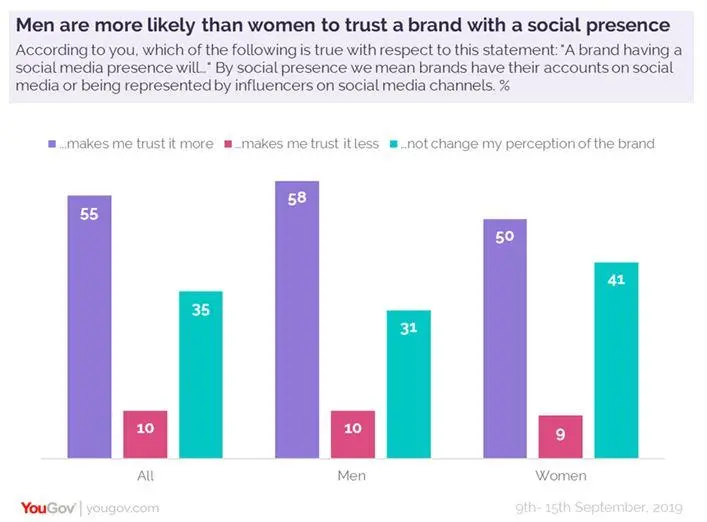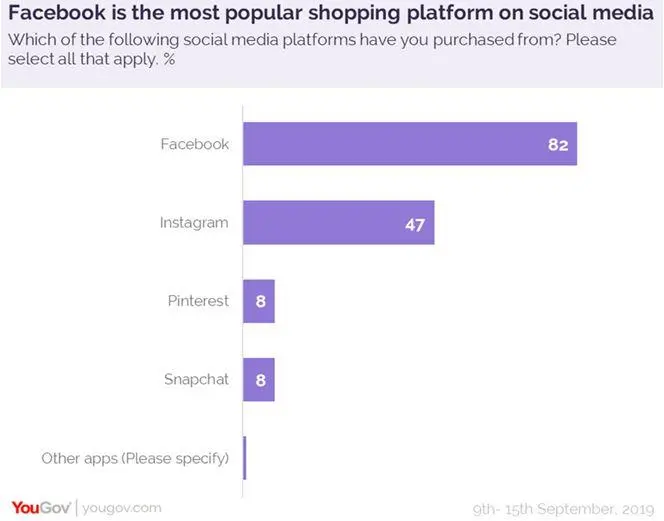The social presence of a brand is seen as a huge factor in creating awareness and lending credibility to it. However, today the role of social media is changing as brands are treating it as a sales platform. YouGov’s new research surveyed UAE respondents on their comfort of shopping on social media and reveals their willingness to embrace the age of social shopping.
The survey shows that a brand having its own social media accounts or being represented online by influencers is perceived positively by people and more than half of them (55%) said it will make them trust the brand more. This social presence is likely to influence brand equity and purchase intent with large numbers saying they trust verified social media accounts for financial transactions (69%) and are more likely to buy from accounts that have an influencer campaign (57%). Even though social presence is important to most, more than a third (35%) seem to be indifferent to a brand’s social persona and that it is unlikely to change their perception while for one in ten (10%) it is likely to make them trust a brand less.


Looking deeper into their comfort of shopping on social media, we saw that 55% people found it convenient and 61% felt it saves time. Slightly more than half (55%) said they follow specific brand accounts on social media for their shopping fix and a similar proportion (56%) of respondents reported being comfortable with brands monitoring their online shopping data in order to extend tailor-made offers to them.
At present, more than half of UAE residents (52%) who shop online at least once a year said they have made a purchase directly through a social media platform (such as Facebook, Instagram, etc.) while 7% have saved it for later. It is interesting to note that while men claim to be more likely to trust a brand with a social presence, it is actually women who indulge more with social media for shopping as compared to men (57% vs 49%).


When it comes to the most popular shopping platform on social media, Facebook stands as the clear winner, with more than four in five social media shoppers (82%) claiming to have made a purchase through this medium. Instagram is the second most popular (47%), and it is interesting to note that a higher number of shoppers who are under thirty have made a purchase through Instagram as compared to those above thirty (59% vs 40%), suggesting the popularity of the platform within this cohort.
Currently, 68% of online shoppers in the UAE prefer shopping from retail websites such as Amazon, Noon.com, etc. 17% prefer buying from brand websites, 9% from social media platforms and 7% don’t have any preference at all. Even though social media is not the most preferred online shopping platform, around two-thirds of UAE residents (65%) have shown the likelihood of buying on social media in the future. Despite the interest, there are many who have concerns regarding the appropriateness of the platform and believe it is meant for networking and not selling (44%). Furthermore, 59% think social media is good for only certain product categories and 62% feel it is a good medium for researching information about products but not for actually buying them.
Data collected online by YouGov Omnibus among 1006 respondents in the UAE between 9th and 15th September 2019 using YouGov’s panel of over 6 million people worldwide. Data is representative of the adult online population in the country.
© Press Release 2019Disclaimer: The contents of this press release was provided from an external third party provider. This website is not responsible for, and does not control, such external content. This content is provided on an “as is” and “as available” basis and has not been edited in any way. Neither this website nor our affiliates guarantee the accuracy of or endorse the views or opinions expressed in this press release.
The press release is provided for informational purposes only. The content does not provide tax, legal or investment advice or opinion regarding the suitability, value or profitability of any particular security, portfolio or investment strategy. Neither this website nor our affiliates shall be liable for any errors or inaccuracies in the content, or for any actions taken by you in reliance thereon. You expressly agree that your use of the information within this article is at your sole risk.
To the fullest extent permitted by applicable law, this website, its parent company, its subsidiaries, its affiliates and the respective shareholders, directors, officers, employees, agents, advertisers, content providers and licensors will not be liable (jointly or severally) to you for any direct, indirect, consequential, special, incidental, punitive or exemplary damages, including without limitation, lost profits, lost savings and lost revenues, whether in negligence, tort, contract or any other theory of liability, even if the parties have been advised of the possibility or could have foreseen any such damages.



















